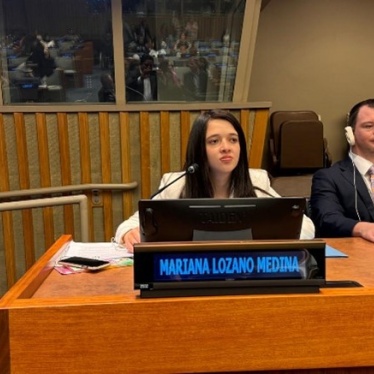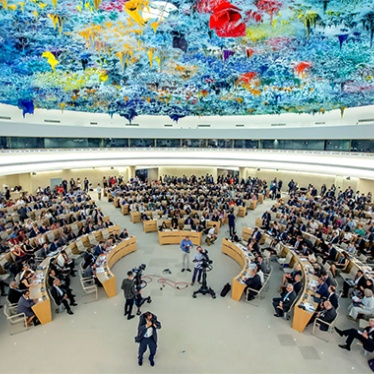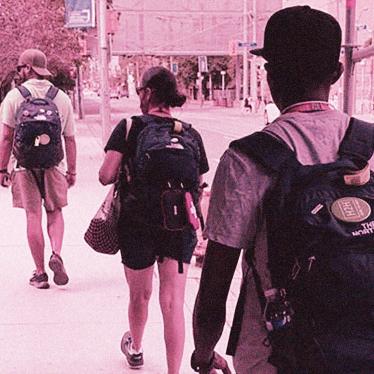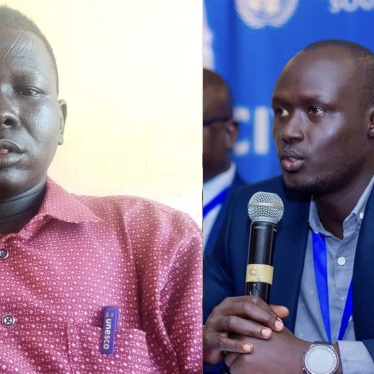Human Rights Watch welcomes the opportunity to provide input to the Committee on the Rights of Persons with Disabilities (CRPD Committee) for its General Comment on the right to live independently and be included in the community. [1]
The issues raised in this submission are based on research and advocacy conducted by Human Rights Watch, in particular on Armenia, Croatia, Ghana, India, Japan, Russia, Serbia, and ongoing monitoring of the right to live independently and be included in the community, including the situation in Brazil.[2]
This submission focuses on the following issues:
- The nature of some of the State obligations under article 19;
- The need for further guidance on the implementation of the right to be in the community for children with disabilities living in institutions and the right to have a family;
- The need for specific mechanisms to strengthen alternative care programs for children with disabilities;
- The need to recognize transitional programs as ways to realize and practice the right to live independently and be included in the community; and
- The need for further guidance on the implementation of the right of older persons with disabilities.
This document does not review every aspect of the right to live independently and be included in the community; rather, it underscores several concerns that figure most prominently in our research and that significantly influence the degree to which persons with disabilities are able to exercise other rights enshrined in the CRPD.
1. The nature of some of the State obligations
Paragraph 41 of Draft General Comment 5, notes that states parties’ obligations under Article 19 have a hybrid legal character: a civil right under 19 (a), the right to choose one’s own residence and where, how and with whom to live; and a classic social right under 19 (b), the right to access individually assessed disability support services. Social, economic and cultural rights are subject to progressive realization, however the obligation with respect to non-discrimination vis a vis these rights is an immediate one and it follows that once states have made progress on the implementation of social, economic or cultural rights, persons with disabilities should also benefit from such progress, otherwise it would be discriminatory. While paragraph 43, following the Committee on Economic, Social and Cultural Rights, calls for a minimum core obligation to be fulfilled to ensure the satisfaction of minimum essential levels, there is no further clarity on what is to be understood by “minimum essential levels” in the context of Article 19 (b).
As it stands, the draft General Comment fails to reflect the interdependent nature of the right to access support services in article 19 (b) and the right to choose one’s own residence and where, how and with whom to live in 19(a). For many persons with disabilities if support is not provided personal choice would be irrelevant. Therefore it is important that the committee does not articulate states’ obligations in a way that may suggest there is a hierarchy in the duty of states to fulfill them.
Any discussion of the hybrid nature of article 19 cannot be allowed to weaken states parties’ obligations under it. Human Rights Watch notes that the CRPD Committee in general comment number 2 on accessibility viewed states’ obligations through the lens of anti-discrimination policies, and urges the committee to consider the same approach here.
We are also concerned that paragraph 47, as drafted, is open to misinterpretation and abuse. The paragraph sets out the principle of autonomy and choice that the right to decide where, how and with whom to live also embraces the decision to live in institutional care settings. However, it could be misused to suggest persons with disabilities are “deciding” to live in institutional care when in real terms they have no meaningful choice. Although the Committee underlines the right to choose residential living does not equate to a state’s duty to maintain institutions, it should for clarity reinforce that on the contrary states parties have to make available meaningful support services to enable persons with disabilities to live independently so that persons with disabilities have genuine choices and can make meaningful decisions about where and how they want to live.
2. The need for further guidance on the implementation of the right to independent living and being in the community for children with disabilities living in institutions
Although the draft general comment 5 addresses the situation of children with disabilities living in institutions and strategies for their deinstitutionalization (paragraphs 11, 23, 34, 51, 69, 70, 73, 74, 84, and 94), and underscores the fact that article 19 also establishes rights on their behalf, further guidance is needed as to how to prevent children from being placed in institutional settings or other places which hinder the possibility of being included in the community and develop skills for independent living. Similarly, under article 23 of the CRPD, children are not to be separated from their families unless it is believed that doing so is in the best interests of the child. Furthermore, the CRPD states: “In no case shall a child be separated from parents on the basis of a disability of either the child or both of the parents,” and requires states parties, in case the immediate family is unable to care for a child with disabilities, to “undertake every effort to provide alternative care with the wider family, and failing that, within the community in a family setting.”
Human Rights Watch research found that states may not have accessible, available services and support systems in place to ensure children with disabilities are not separated from their families and are able to live in the community.[3] For example, due to lack of health care, inclusive day care and education, and support services in the community, children with disabilities in Serbia continue to be placed in institutions, even though many have a living parent. Human Rights Watch documented similar conditions in Armenia and Russia[4].
Governments should be encouraged to establish, staff, and fund social services, including support groups, for parents of children with disabilities led by professionals with appropriate training and knowledge on the rights, dignity, and potential of children with disabilities, and with knowledge of the challenges that children with different type of disabilities and their families face to live and participate in their communities. Professional social work services for parents could facilitate referrals to the appropriate services needed to ensure children with disabilities are not separated from their parents.
Parents of children with disabilities caring for their children at home, may experience challenges such as the lack of accessibility to or the absence of inclusive pre-schools, schools, childcare centers as well as health care, rehabilitation centers with appropriately trained staff.[5] For example, Ana, a single mother of a 12-year-old girl with physical and intellectual disabilities in Serbia[6] who lives five days a week in an institution and spends weekends at home, told Human Rights Watch:
“Not one single day-care center wanted to accept her. They explained they found her too hyperactive. I’ve spent a year and half begging for an alternative where my daughter could spend her time while I was at work and I did not succeed. Three years ago, with no other option available, I placed her in an institution. Now, she can also access education with other children in the institution.”
Having a person with a disability in the family often places significant financial burdens on families, which cannot be easily absorbed by families without support from the state. In Serbia, Human Rights Watch documented that a parent of a child with high support needs who lives in the community often stays at home to care for the child, forfeiting paid employment and placing financial strain on the family. At the same time, a parent in Serbia cannot be recognized as the caregiver of their child with disabilities in the same way as a foster parent, meaning that a parent cannot be compensated for taking care of a child with disability. This also often means that the family has difficulty paying for the necessary therapeutic services, medication, or transport to appointments. Similarly, in Brazil, Human Rights Watch met a mother of a three-year-old boy who had to quit her job to care for her child at home.[7]
We urge the Committee to recommend governments to ensure the establishment and maintenance of a range of targeted, accessible, diversified community-based services for families in difficult situations, as well as for individuals, including children with disabilities and their families, to prevent institutionalization and to support families to raise their children at home.
Parents with children with disabilities should have access to economic incentives – which could include tax breaks, specific grants, affordable education and housing – to help accommodate for any extra costs that stem from disabilities.
3. The need for specific mechanisms to strengthen alternative care programs for children with disabilities to enable them to live independently and be included in the community
In Armenia, Brazil, Croatia, Russia and Serbia, Human Rights Watch found that alternative care programs in family-based settings for children with disabilities who have been separated from their families – due to poverty, pressure by medical professionals on parents to give up their child with a disability, abandonment, neglect, lack of local support services or other reasons – are unavailable.[8] In Croatia, Brazil, Serbia, Russia, and India, we found that separation from families leads to the placement of children with disabilities in institutions for prolonged periods of time, even for life.
Conditions in these institutions can be dire in terms of lack of access to education, skills development, social interaction, rehabilitation and other life skills that enable children to be autonomous and independent. Human Rights Watch documented in several countries, i.e., Russia, that children with disabilities often face serious neglect and abuse inside institutions, including beatings and psychological violence, involuntary and inappropriate medical treatment, use of abusive physical restraints, seclusion and sedation. These abuses can severely impede their physical, intellectual, emotional, and social development, making it difficult for children to become autonomous and independent later in life.
Some governments, including in Brazil, Russia, Armenia and Serbia, justify placement of children with disabilities with high support needs in institutions in the name of “care and treatment”, and fail to include this population in efforts to place children in alternative care programs or adoption. This should be considered a form of disability-based discrimination.[9]
Human Rights Watch research has found that children who were deemed to be “severely disabled” were left behind in deinstitutionalization efforts in Serbia with government officials claiming their needs cannot be answered in a community setting. In Armenia, while the government has plans to close or transform three orphanages for children without disabilities, it has no plans to close or transform orphanages for children with disabilities. Keeping children with disabilities, including those with high support needs, in institutions instead of to a family-based environment is discriminatory against children with disabilities. This practice could also lead to significant numbers of children with disabilities spending the rest of their lives in institutions.
The Committee should include recommendations calling on states to make alternative care programs in family-based settings accessible for all children with disabilities. Governments should ensure that systems promoting and implementing foster care and adoption take specific measures to ensure children with disabilities are placed in foster and adoptive families on an equal basis with children without disabilities. States should pay particular attention to ensuring children with high support needs are included in alternative care programs such as foster care or adoption. Governments should also conduct outreach and awareness raising campaigns to facilitate inclusion of all children with disabilities in foster care and adoptive families. No matter their level of support needs, every child has the right not to be deprived of a life in a family setting.
4. The need to recognize transitional programs as ways to realize and practice the right to live independently and be included in the community
Draft General Comment 5, paragraph 28, recognizes that residential services could be useful “when persons with disabilities make the transition from institutions to independent and community living and might be necessary for persons who have lived in institutional settings for a long time and need to find out how they prefer to live”. Human Rights Watch found that some countries, such as Armenia, Croatia, Brazil and France, have put in place public and private partnership programs to create residential services (small group homes of no more than 10) for people with disabilities whose purpose is to promote autonomy and living skills for people with disabilities who have lived in institutions for prolonged periods of time. Efforts like this should be encouraged, as long as residential services do not serve as substitutes for institutionalization (with numerous restrictions on liberty and choice), and as long as quality services that allow persons with disabilities to live at home are available and accessible. For example the government of Croatia considers family homes, run by private individuals and which can accommodate up to 20 individuals with intellectual or psychosocial disabilities, and foster families where people with disabilities live without their consent as non-institutionalized community living arrangements. However, Human Rights Watch research indicates that family homes are in fact small institutions and that foster homes where people are placed without their consent may amount to institutionalization, allowing people only limited interaction with the community.
Persons with disabilities should be actively involved in the management of residential service programs to prevent them from becoming institutionalization with a different name. Some small group homes visited by Human Rights Watch in Brazil are run by service providers who formerly managed institutions for persons with disabilities and they have the tendency to replicate the culture and attitudes of institutionalization in the residential service programs.[10] In at least two inclusive residencies visited in Brazil, staff has a very paternalistic approach in the management of this new policy, undermining the purpose of these program which is to enable persons with disabilities to acquire new capabilities to live independently and be included in the community.
In Croatia, Human Rights Watch research found that there is limited community housing and support for persons with disabilities even if they are permitted to leave an institution. Many individuals with psychosocial or intellectual disabilities that Human Rights Watch interviewed said they have no real choice in deciding their living arrangements and from whom they get support once they leave an institution. To benefit from state assistance for housing and support services, they usually live in community-based living arrangements established and monitored by the institution and continue to receive assistance and service from the institution. Those who would prefer to live with friends or family or on their own are no longer entitled to government financial assistance for housing and support services.
To address these challenges, the CRPD Committee should clarify that no person can be placed in group homes or other residential services without a real choice and consent. Also, residential service offered as an option should be done as part of a comprehensive plan to ensure that community services, such as personal assistance outside the residence, are available for persons with disabilities. Governments should also ensure that staff in residential service programs are trained on the standards and spirit of the CRPD.[11]
5. The need for further guidance on implementation of the right of older persons with disabilities to independent living and being in the community
Older persons with disabilities are also rights holders under article 19, as the Draft General Comment 5 rightly acknowledges (paragraph 23). However, more guidance is needed as to what specific policies states should implement to ensure this right is adequately implemented to benefit older persons with disabilities. Among other things, governments should develop specific awareness raising campaigns for older persons with disabilities to let them know the scope of the right. The government should also develop or strengthen support services and supported decision making mechanisms for older persons with disabilities. Governments should never place older persons with disabilities in residential services against their will, and should ensure that older persons with disabilities have access to all support services designed for persons with disabilities.
Governments should assess existing residential services that lodge older people with disabilities without their consent and include these facilities in deinstitutionalization programs. This will facilitate their reintegration into the community with proper support.
[1] Convention on the Rights of Persons with Disabilities (CRPD), adopted December 13, 2006, G.A. Res. 61/106, Annex I, U.N.GAOR Supp. (No. 49) at 65, U.N. Doc. A/61/49 (2006), entered into force May 3, 2008, art. 19.
[2] Human Rights Watch, "When Will I Get to Go Home?”: Abuses and Discrimination against Children in Institutions and Lack of Access to Quality Inclusive Education in Armenia, February 22, 2017 https://www.hrw.org/report/2017/02/22/when-will-i-get-go-home/abuses-and-discrimination-against-children-institutions; Human Rights Watch, “Once You Enter, You Never Leave”: Deinstitutionalization of Persons with Intellectual or Mental Disabilities in Croatia, September 23, 2010 http://www.hrw.org/reports/2010/09/23/once-you-enter-you-never-leave; Human Rights Watch, “Like a Death Sentence”: Abuses against Persons with Mental Disabilities in Ghana, October 2, 2012 http://www.hrw.org/reports/2012/10/02/death-sentence; Human Rights Watch, “Treated Worse than Animals”: Abuses against Women and Girls with Psychosocial or Intellectual Disabilities in Institutions in India, December 3, 2014 https://www.hrw.org/report/2014/12/03/treated-worse-animals/abuses-against-women-and-girls-psychosocial-or-intellectual; Human Rights Watch, Without Dreams: Children in Alternative Care in Japan, May 1, 2014, https://www.hrw.org/report/2014/05/01/without-dreams/children-alternative-care-japan; Human Rights Watch, Abandoned by the State: Violence, Neglect and Isolation for Children with Disabilities in Russian Orphanages, September 15, 2014 https://www.hrw.org/report/2014/09/15/abandoned-state/violence-neglect-and-isolation-children-disabilities-russian; Human Rights Watch, “It is My Dream to Leave This Place”: Children with Disabilities in Serbian Institutions, June 8, 2016 https://www.hrw.org/report/2016/06/08/it-my-dream-leave-place/children-disabilities-serbian-institutions; Human Rights Watch Letter to Senator Lidice da Mata, “Brazil: Reject Bill Undermining the Rights of People with Disability, Establish Special Multi-stakeholder Legislative Commission”, December 20, 2016, https://www.hrw.org/news/2016/12/20/brazil-reject-bill-undermining-rights-people-disability-establish-special-multi
[3] Human Rights Watch, “When Will I Get to Go Home?”; Human Rights Watch, “Once You Enter, You Never Leave; Human Rights Watch, “Treated Worse than Animals; Human Rights Watch, Without Dreams; Human Rights Watch, Abandoned by the State; Human Rights Watch, “It is My Dream to Leave This Place; Human Rights Watch Letter to Senator Lidice da Mata, “Brazil: Reject Bill Undermining the Rights of People with Disability, Establish Special Multi-stakeholder Legislative Commission”.
[4] Human Rights Watch, “When Will I Get to Go Home?”; Human Rights Watch, Abandoned by the State.
[5] Human Rights Watch, “It is My Dream to Leave This Place”.
[6] Ibid.
[7] Interview with Daniel Sol, parent of a three-year-old with a disability. Rio de Janeiro, Brazil, November 8, 2016.
[8] Human Rights Watch, “Once You Enter, You Never Leave”; Human Rights Watch, “Abandoned by the State; Human Rights Watch, “It Is My Dream to Leave This Place”; Human Rights Watch, “When Will I Get to Go Home?”
[9] Human Rights Watch Letter to Senator Lidice da Mata, “Brazil: Reject Bill Undermining the Rights of People with Disability, Establish Special Multi-stakeholder Legislative Commission”; Human Rights Watch, Abandoned by the State; Human Rights Watch, “It is My Dream to Leave This Place.
[10] The manager of an inclusive residence in São Paulo, Brazil, told Human Rights Watch that institutions and inclusive residencies were the same thing but with a different name.
[11] Ongoing research HRW is performing in Brazil has shown that residential services program managers understand the new policy only as building smaller institutions, instead of framing residential services as a life-skills building program.







